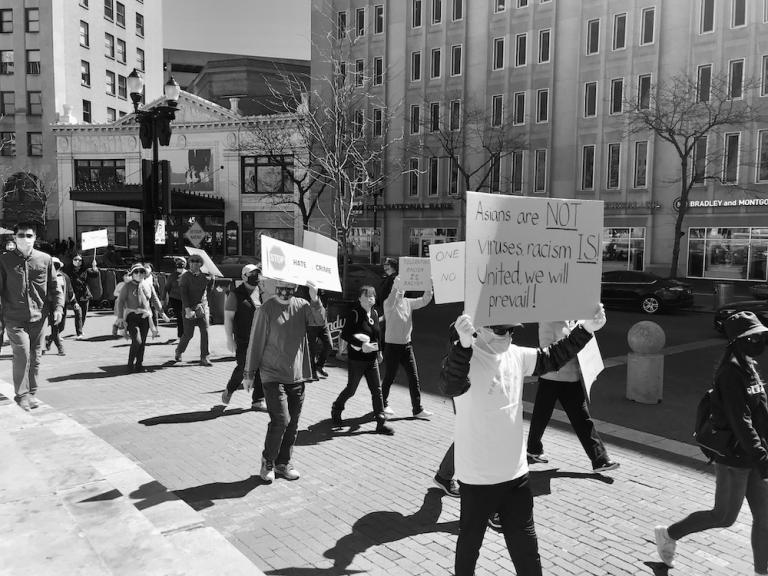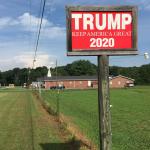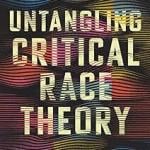
Last week the advocacy organization Stop AAPI Hate issued its newest report about anti-Asian racism over the past two years. Stop AAPI Hate received 11,500 reports of hate incidents in the two years since launching their online reporting system, and the findings continue to be sobering: that the problem of anti-Asian racism takes many forms, from verbal harassment and civil rights violations to physical violence; that it affects Asian Americans of diverse backgrounds, but especially women, LGBTQ+ people, non-binary people, and elderly people; and that it has affected Asian Americans located in all corners of the country. Moreover, the report confirmed what many of us already know from firsthand experience: that the reality of racism has had a profound impact on mental health. Almost half of the people who reported an incident to Stop AAPI Hate also reported that they were experiencing depression or anxiety.
What struck me as notable about this newest report is that it not only discussed the problem of anti-Asian racism, but also potential solutions. The reported focused on three spheres of action: education, community safety, and civil rights. But for me, as a scholar of both politics and religion, the report made me curious about other forms of responding to the problem. What is the role of religion in responding to the alarming rise in anti-Asian racism and violence? I’m particularly interested in the interplay of religion and racial justice activism. How has religion shaped how Asian American activists have pushed for change?
In conversations about responses to anti-Asian racism—which, to be honest, pales in comparison to the attention given to conversations about the problem of anti-Asian racism—much of the attention has gone to the work done by government and by non-religious civic groups such as Stop AAPI Hate and Asian Americans Advancing Justice. The efforts by these institutions are certainly important and worthy of attention.
But I would argue that, as a general principle, we can’t adequately understand any social movement without paying attention to religion. In my research over the past two years, I’ve found that Asian American Christians have been central to activism against racism and violence and have been pushing for change on several fronts. Some activists have focused their attention on their fellow Christians and have challenged their churches to confront racism within their own religious communities. Others have drawn on their faith in order to pursue change beyond the church by calling for accountability for political leaders and urging the broader public to address the problem of anti-Asian racism through a variety of local, state, and national-level actions. The forms of action have varied, but the common thread is this: in the current moment, as in the past, religious commitments have animated racial justice activism within Asian American communities, with far-reaching—if under-appreciated—impact.
Anti-Racism Activism and Asian American Christianity in Historical Context
The robust Asian American Christian responses to contemporary anti-Asian racism was long in the making. Specifically, it is the convergence of two histories—first, the tradition of racial justice work among Asian American Christians and, second, the steadily growing presence of Asian Americans in Christian communities in the United States over the past half century.
In contrast to the common belief that Asian Americans stay quiet in the face of racial injustice and that recent anti-racism activism is “new,” Asian American Christians have long insisted—vocally, visibly, and vehemently—on fair treatment and racial equality. Their religious beliefs and networks have often powered their campaigns for justice as far back as the nineteenth century. For example, in 1885, when Mamie Tape was denied admission to the Spring Valley Primary School on the basis of her race, her mother, Mary Tape, took the case to court. She later wrote a letter to the San Francisco School Board in which she cited Christian arguments for why her Chinese American daughter should be permitted to attend a school with white children. “Is it a disgrace to be Born a Chinese?” she asked in her letter, which was published in a local newspaper. “Didn’t God make us all!!!”
Christianity was also an important aspect of West Coast civil rights activism in the twentieth century. As the historian Stephanie Hinnershitz argued, Asian students seeking fellowship with people of the same cultural and religious background formed their own organizations, such as the Filipino Students Christian Movement (FSCM), the Japanese Students’ Christian Association in North America (JSCA), and the Chinese Students’ Christian Association in North America (CSCA). These Asian Christian associations facilitated a new racial consciousness, and they were at the center of a surge in interethnic activism to address the problem of anti-Asian racism both on and off campus. According to Hinnershitz, the ties among these Asian Christian students were important not just to foreign-born Asian students contending with discrimination, but had an impact on future generations of Asian Americans fighting for rights and racial justice. “[T]he Christian networks contributed to and shaped a growing West Coast civil rights movement through the interwar years and into the post-World War II era,” Hinnershitz wrote. Later in the twentieth century, Christian activists participated in the Asian American movement. As the historian Jane Hong argued, organizations such as the Asian American Christian Theologies and Strategies (ACTS) in Berkeley, California, and Agape Fellowship, a Christian commune in Los Angeles, illustrate how Asian American Christians connected their religious and racial identities and drew on their Christian faith as an important force behind their work to address social injustice.
Migration patterns and changing demographics in the United States over the past half century have also put Asian Americans in a position of increased presence and prominence within American Christian churches. While the 1965 Hart-Celler Act increased the presence of Muslims, Hindus, and more in the United States, one of the biggest consequences of liberalized immigration policies in the mid-twentieth century is increased racial diversity within American Christianity because the majority of these more recent immigrants have identified as Christian. The sociologist R. Stephen Warner famously referred to this phenomenon as “the de-Europeanization of American Christianity,” but as a scholar of transpacific migration and religious life, I’m particularly intrigued by what I’d describe as the Asianization of American Christianity. This demographic shift has occurred across denominations. The Catholic Church, for example, has long identified itself as an immigrant church, but post-1965 immigrants have made it more multiracial and multicultural than ever, with Filipino and Vietnamese migrants playing a particularly important role in increasing the number of Asian American Catholics. Asian Americans have also contributed to demographic change within American Protestant churches, both mainline and evangelical.
It’s worth pointing out that among Asian American Christians are particularly pious. According to a study by the Pew Research Center, Asian American Christians in all three categories—evangelicals, mainline Protestants, and Catholics—report weekly church attendance at rates that are far higher than their white counterparts. In addition, compared to other Christinas in the United States, a greater share of Asian American Christians believe that living a very religious life is one of their most important goals. The dedication of Asian Americans to church life has become such a cultural phenomenon that Asian church politics have inspired characters and plots on television sitcoms—think of Mrs. Kim on the show Kim’s Convenience.
Asian American Christians are not only a growing and powerful constituency within churches, but they are also in prominent positions of leadership within the church. Consider, for example, the current leaders of some of the most influential organizations within American evangelicalism: the President of the National Association of Evangelicals, for example, is Walter Kim, a Korean American pastor and scholar; the President and CEO of InterVarsity Christian Fellowship is Tom Lin; and the President of the Gospel Coalition is Julius Kim. Asian Americans are also serving as leaders in seminaries, denominations, congregations, and parachurch organizations.
How Asian American Christians Are Challenging Racism Today
It is against this backdrop—both the long history of Asian American Christian engagement in racial justice activism and the increased importance of Asian Americans in American Christian churches—that we must view how Asian American Christians have responded to the rise in anti-Asian attacks over the past two years. Their efforts have aimed to change the hearts, minds, and actions of fellow Christians as well as the broader public, including political leaders.
One of the most notable ways that Asian American Christians have urged churches to address anti-Asian racism is through public statements issued by or through denominations. In these statements, Asian American Christians offered personal testimonies of discriminatory treatment and harassment. Take, for example, the reflection shared by Vineyard USA and written by Dennis Liu, a pastor of Vineyard of Harvest Church and Leader of the Vineyard Asian American Network. Liu shared how even in a predominantly Asian American community, he experienced anti-Asian racism firsthand:
Growing up in an area of New Jersey with relatively few Asians at the time, I faced racism every single day. But the prevailing sentiment demanded us to be “colorblind” and “just all get along.” I felt stifled as I had no choice but to suppress deep emotions stemming from daily discrimination, prejudice, and even blatant racism. But then I moved to Los Angeles where my neighborhood is 65% Asian. I thought I was safe – but I was wrong! Last year, soon after the onset of COVID-19, I was out for a walk with my wife and my 4 young children. One of my neighbors walked out on the lawn and yelled a racial slur at us. I was deeply hurt and troubled. Is there nowhere safe in this country for Asian Americans like me and my family? Will I consistently and everywhere be targeted simply because of my Asian features?
By telling his story, Liu’s statement emphasized an important message that Asian American Christians—and Asian Americans in general—have sought to convey over the past two years: yes, Asian Americans experience racism, too.
Other statements took a different approach, and instead of sharing personal stories, the authors put contemporary anti-Asian racism in the context of the longer history of racism in America. An example of this type of statement is the one written by the Asian Pacific Catholic Network and shared on the website of the United States Conference of Catholic Bishops. The statement lamented racism in both past and present:
The public uproar against systemic racism resonates in our Asian and Pacific communities. In the many protest rallies, thousands among us marched side by side with sisters and brothers from the African American and other racial groups. Harking back to Asian American history, from the Chinese railroad workers, to Filipino, Japanese, and Korean agriculture and field laborers, the experience of Asian and Pacific Islanders spans both ends of the racial spectrum. We have been victims of overt and subtle forms of racism, and more so in recent racist rants and physical attacks as Corona virus-carriers. Disturbing news reports from Los Angeles, the Bay area, New Jersey and elsewhere document acts of hate and intolerance. We cannot stop noticing the sad reality that racism is alive and well in this country notwithstanding the Civil Rights Act of the 1960s.
Asian American Christians have also worked outside of traditional denominations. The Asian American Christian Collaborative (AACC) is perhaps the best example of a parachurch institution that advocates around Asian American needs. Early in the pandemic, the AACC issued a statement about anti-Asian racism that spoke directly to Asian Americans and acknowledged their pain and their needs. In addition, the AACC had a strong message to Christian leaders, whom they urged to “speak without ambiguity against racism of every kind.” The AACC statement declared,
Faithful Christian witness requires anti-racist work, and silence only perpetuates the sins not addressed. This includes going beyond shallow acknowledgement of the most obvious incidents of racism to taking responsibility in confronting the longstanding tendencies of people to discount and dismiss the realities of racism. It also includes addressing the disbelief and disobedience of your constituents who continue to ignore members of the body of Christ who are in pain and under threat.
The AACC (gently) urged fellow Christians to confront the racism perpetuated by silence in their own communities and identified church members’ “disbelief and disobedience” as a source of harm to Asian Americans. Against Christian Xenophobia, an effort led by Lucas Kwong, went even further. In this project, Kwong shared a list of American politicians who identified as Christian and who used or advanced rhetoric and policies that were xenophobic, nationalistic, and racist. These politicians, Kwong argued, “use a nationalistic version of the Christian faith to launder their disregard for Asian lives.” Kwong also identified the churches to which the these politicians belonged and demanded action from both the politicians and church leaders. As Kwong wrote in his open letter,
We demand that the named politicians publicly repent and take steps to remedy the harm they have caused, both to Asian Americans and to the reputation of Christ’s church. We also demand that the religious leaders who have chosen to ignore their congregants’ bigotry, often while claiming to care about racial justice, make amends for damaging the church’s witness. Finally, we call for solidarity from members of these churches in the event that their leaders do not take sufficient action.
Kwong urged members of the public to educate themselves about their political and religious leaders and also to sign a letter of support and solidarity.
Finally, Asian American Christians have played a critical role in research and advocacy organizations that have raised awareness of the issue of anti-Asian racism, urged community action, and pushed for policy changes at all levels of government. Importantly, while these organizations are not themselves religious, the individuals involved in the work are still openly driven by religious commitments. To illustrate this type of response, let’s return to the work of Stop AAPI Hate, which was co-founded by Russell Jeung, Professor of Asian American Studies at San Francisco State University. (Full disclosure: my research team and I have contributed research to Stop AAPI Hate.) In an essay in Sojourners in April 2022, Jeung shared how his religious faith has animated his advocacy for racial justice:
…[A]s someone who grew up in a Chinese American church in San Francisco, I know history repeats itself in another way: God repeatedly breaks into history and uses God’s people to bring out transformative hope. In the church, we call these moments where God breaks in kairos moments. Though SAH [Stop AAPI Hate] is not a faith-based organization, one of my primary motivations in starting SAH was to bear witness to God’s way of right relations—a world where no group is excluded because of their race.
Jeung’s experience illustrates how even in racial justice spaces where religion is not most obviously at work, it is, in fact, central to the work.
It remains to be seen what will come of the efforts undertaken by Asian American Christian activists. Some, like Jeung, have already had an immediate-term impact, while others have been involved in the more longterm mission of helping an entire communities reimagine who they are and how they want to stand in relation to the systemic problem of American racism.
If anything, the actions by these activists invite scholars to think anew about religion, racism, and activism. On one hand, reflecting on their work helps us think about Asian Americans in new ways. First, we can more fully recognize the religiousness of Asian American communities and, more specifically, the religiousness of Asian American social activism.
Their story helps us think about American Christianity, especially American evangelicalism, in new ways, too. We can see the impact of Asian Americans on American Christianity, and we are invited to wonder about the possibilities for racial justice work within American Christianity and American evangelicalism in particular. Both public and scholarly conversations about evangelicalism and race have tended to focus on white evangelicals and their lack of support for racial justice. But non-white evangelical Christians, who are a growing presence in America, render a more complex portrait about the relationship between religion and race, and their actions suggest a future that might be complicated than we would otherwise presume.













